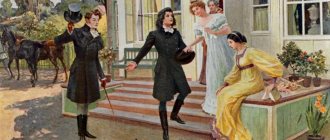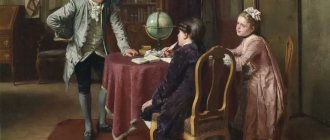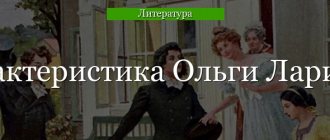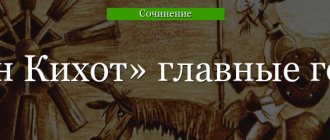The image of the author in the novel “Eugene Onegin” plays a significant role. The narrator is present throughout the entire work. It helps the reader understand the characters, imagine the setting, situations. Author's comments characterize the characters and express the writer's opinion regarding their actions. Pushkin positions himself as a friend of the main character and has acquaintances in his circle. He is a full-fledged character in the novel along with other heroes.
The author created two main male roles - Eugene and the narrator. They are closely interconnected, the writer compares them with each other, compares character traits and attitudes to life. The image of the author in Pushkin’s novel “Eugene Onegin” contributes to a deep revelation of the essence of the main character. He helps the poet express his thoughts, share knowledge and impressions. Literary digressions recreate a complex picture of the era, secular society, and nobility.
The narrator does not like to write about himself - once he mentioned that he was thirty years old. This is the time to give up youthful entertainment and become a wise, serious person. The image of the author in “Eugene Onegin” helps to identify the hero’s shortcomings. He is the same age as the narrator, but does not become wiser, continues to waste time aimlessly, without thinking about the future.
The image of the author in the novel “Eugene Onegin”
In the poem "Eugene Onegin" Pushkin acts as a narrator of events, expresses his own attitude towards the characters and events. But at the same time, he is one of the heroes of the novel.
In the introduction, the author introduces his new creation. He talks about his attitude to what is written.
I finished the first chapter; I reviewed all this strictly: There are a lot of contradictions, But I don’t want to correct them.
The poem has 27 lyrical digressions. In them the poet speaks on his own behalf, sometimes about himself. Lyrical digressions help express the passage of time and partially reveal to us the image of the author of the novel.
In the poem, Pushkin says several times that he wants to move from poetry to prose.
Even though I love my hero from the bottom of my heart, Even though I will return to him, of course, But now I have no time for him. They are pushing Lethe towards harsh prose, Lethe is chasing naughty rhyme, And I - with a sigh - I admit - I am lazier in following her.
In the 6th chapter, Pushkin mentions that he is already 30 years old, realizes that the time of youth has passed, and he, the author, is setting out on a new path in life. Readers, of course, know that Pushkin had grandiose plans for creating epic works.
In the last chapter, the poet tells a little about himself, recalls his youth at the Lyceum, where he began to write his creations and where
Old man Derzhavin noticed us, and went into the coffin and blessed us.
Here he recalls his southern exile, his trip to the Caucasus and Moldova. Talking about his heroes, Pushkin shows himself to be either friendly, ironic, sad, or passionate. He speaks with love about his heroes, teaches them to love their native land, nature, and people.
By Muse, the poet means his creative inspiration, and says that he is bringing her to a social event for the first time. He praises nature amazingly. In “Eugene Onegin” alone, all 4 seasons of the year are glorified; he writes warmly about the village, about Russian fields, recalls theatrical productions and actresses who shone on stage; Pushkin brings the reader to a social event for the first time.
"Onegin, my good friend." The author repeatedly throughout the novel talks about his personal acquaintance with Onegin. For example, in the poem there is a phrase that Pushkin and his friends tried to introduce Onegin to the laws of poetry, but to no avail. He often communicated with his hero.
At first Onegin's language confused me; but I’m used to his caustic argument, And to the joke, with bile in half, And the anger of gloomy epigrams.
And even Onegin was going to go on a trip to Africa with the author, but the death of his father ruined their plans.
Onegin has a lot in common with the author. Pushkin, like Onegin, loved secular entertainment; they had a similar noble upbringing. True, Pushkin received his education at the Lyceum, and Onegin’s upbringing was limited to home education. But still these are different people. Onegin was mentally lazy, skeptical and indifferent. Pushkin had a passionate nature, wanted to be useful to society, and worked a lot in the literary field.
In one of the digressions, Pushkin reports that he also lived in St. Petersburg:
I once walked there too: But the north is harmful to me.
In the lyrical digression “My Goddesses, what are you, where are you,” Pushkin talks about his attitude to the ballet and theater of his time. He admits that he loved St. Petersburg balls. Pleasant memories of the cute legs that the poet once loved are found not only in Eugene Onegin. But here the poet does not name the one who once captured his imagination.
The author is also close to Tatyana. He admits that he loves his heroine. He sympathizes with the girl, respects her feelings, justifies her actions, translates her letter into Russian for the reader, and admits that he sacredly cherishes her letter. How did it come into his hands? After all, it was written to Onegin. Pushkin does not report this. But he says that he sacredly protects it.
I read with secret melancholy, And I can’t finish reading. Who inspired her with this tenderness and words of kind carelessness?
Pushkin seems to evaluate the actions of his hero from the outside.
You will agree, my reader, that our friend acted very kindly to sad Tanya; Not for the first time, he showed the Soul direct nobility here.
At the end, the author says goodbye to the reader and says that there was a girl who served as a prototype for Tatyana and her life was not easy. Oh, fate has taken away a lot, a lot!
Thus, the reader feels the presence of the author throughout the entire novel “Eugene Onegin”.
Author's image
The image of the author in the novel “Eugene Onegin” is unique. This is not just an aloof narrator, but a full-fledged hero who, in a friendly manner, describes the characters, their relationships, gives advice, and shares philosophical reflections.
The portrait of the author has not been revealed: he is an invisible man who has neither a name nor an appearance. We only know that at the time of the story he was thirty years old. However, based on some signs, it becomes clear that this image has a lot in common with A.S. Pushkin himself. This is indicated by similarities in biography (study at the Lyceum, passion for poetry, life in St. Petersburg, and then in the village, etc.) and life views.
In philosophical digressions, the author appears as a wise man who has known a lot in his life: love, betrayal, disappointment. However, despite his sad experience, he does not cease to love this world, people, and see a wonderful beginning in them.
The author, in his characteristic ironic manner, ridicules what is alien to his nature: hypocrisy, debauchery, vulgarity, commercialism. Being a naturally bright, cheerful person, he sings of love and beauty and encourages the reader to enjoy every moment.
Check out what else we have:
- for the most rational - Summary of “Eugene Onegin”
- for the most impatient - A very brief summary of “Eugene Onegin”
- for the most sociable - The main characters of "Eugene Onegin"
- for the busiest - Reader's diary "Eugene Onegin"
- for the coolest - Read “Eugene Onegin” in full
Pushkin (author) and Onegin - the main characters
Pushkin worked on the novel “Eugene Onegin” for many years; it was his favorite work. Belinsky called it “an encyclopedia of Russian life.” Indeed, this novel gives a picture of all layers of Russian society: the high society, the small nobility, and the people.
During the years of writing the novel, Pushkin had to go through a lot, lose his friends, experience the bitterness of the death of the best people of Russia. For the poet, the novel was, in his words, the fruit of “a mind of cold observations and a heart of sorrowful observations.” The image of the author in the novel is created by lyrical digressions; there are twenty-seven significant ones in the novel and about fifty small ones.
Who is the main character of the novel “Eugene Onegin”? Many believe that the main character of the novel is Pushkin himself. If you read the novel more carefully, you can see that there is not one main character, but two: Onegin and Pushkin. We learn almost as much about the author as we do about Eugene Onegin.
They are similar in many ways; it is not for nothing that Pushkin immediately said about Evgeniy that he is “my good friend.” Pushkin writes about himself and Onegin: We both knew the game of passion, Tomila, the life of both of us, The heat died out in both hearts... The author, like his hero, tired of the bustle, cannot help but despise people of the world in his soul, tormented by memories of his youth , bright and carefree.
Pushkin likes Onegin’s “sharp, chilled” mind, his dissatisfaction with himself and the anger of his gloomy epigrams. When Pushkin writes that Onegin was born on the banks of the Neva, talks about Onegin’s upbringing, about what he knew and could do, Pushkin himself involuntarily introduces himself all the time.
The author and his hero are people of the same generation and approximately the same type of upbringing: both had French tutors, both spent their youth in St. Petersburg society, they have common acquaintances and friends. Even their parents have similarities: Pushkin’s father, like Onegin’s father, “lived in debt...” Summarizing, Pushkin writes: “We all learned little by little, something and somehow, but with our upbringing, thank God, it’s no wonder we shine.”
The poet involuntarily notes his difference from Onegin. About Onegin, he writes that “he could not distinguish iambic from trochee, no matter how hard we fought.” Pushkin, unlike Onegin, is engaged. poetry seriously, calling it “high passion.” Onegin does not understand nature, but the author dreams of a quiet, calm life in a paradise where he could enjoy nature.
Pushkin writes: “The village where Onegin was bored was a charming corner.” Pushkin and Onegin, for example, perceive theater differently. For Pushkin, the St. Petersburg theater is a magical land that he dreams of in exile. Onegin “enters, walks between the chairs along the legs, the double lorgnette, squinting, points at the boxes of unfamiliar ladies,” and then, barely glancing at the stage, with an absent-minded look, “turned away and yawned.”
Pushkin knows how to rejoice in what Onegin is so bored and disgusted with. For Onegin, love is the “science of skin passion”; Pushkin has a different attitude towards women; real passion and love are available to him. The world of Onegin and Pushkin is a world of social dinners, luxurious entertainment, drawing rooms, balls, this is the world of high-ranking persons, this is the world of high society, which is far from easy to get into.
Reading the novel, we gradually understand Pushkin’s attitude towards secular society and the noble class, to which he himself belongs by birth. He sharply criticizes the St. Petersburg high society for its falsehood, unnaturalness, and lack of serious interests. The author treats the local and Moscow nobility with ridicule. He writes: It’s unbearable to see in front of you a long row of dinners, to look at life as a ritual, and to follow the decorous crowd, without sharing with them neither common opinions nor passions...
It is not easy for Pushkin to live, much more difficult than for Onegin. Onegin is disappointed in life, he has no friends, no creativity, no love, no joy, Pushkin has all this, but no freedom - I am exiling him from St. Petersburg, he does not belong to himself. Onegin is free, but why does he need freedom?
He languishes both with her and without her, he is unhappy because he does not know how to live the life that Pushkin lives. Onegin doesn’t need anything, and that’s his tragedy. If Pushkin enjoys nature, then Onegin doesn’t care, because he clearly sees that “boredom is the same in the village.”
Pushkin sympathizes with Tatyana, who lives among the “wild nobility” in the village, and then in the high society of St. Petersburg, which she says is “the rags of a masquerade.” The author not only sympathizes with Tatyana, he writes: “I love my dear Tatyana so much.” Because of her, he comes into conflict with public opinion.
In one of the lyrical digressions, the author reveals to us his ideal of a woman who “is gifted from heaven with a rebellious imagination, a living mind and will, and a wayward head, and a fiery and tender heart.” Pushkin admits that he sacredly cherishes Tatiana’s letter and cannot read enough of it.
Many lines of the novel reveal to us the biography of the author, the beginning of his creative path, the names of his idols, the events of the literary struggle, a reflection of the sentiments of social groups and literary groups. Many of the poet’s lyrical digressions are devoted to the cultural life of Russia at the beginning of the nineteenth century.
From these lines we learn that the poet was an ardent theatergoer. He writes about the theater: “There, under the shade of the wings, my younger days rushed.” Reflecting on the meaning of human existence, on the meaning of youth in the life of every person, Pushkin says with bitterness: But it’s sad to think that youth was given to us in vain, that they cheated on it all the time, that it deceived us.
Finishing the novel, Pushkin again turns his gaze to those whom he loved in his youth, to whom he remained faithful in heart. No matter how different Pushkin and Onegin may be, they are from the same camp; they are united by dissatisfaction with the way Russian reality is structured. The smart, mocking poet was a real citizen, a man who was not indifferent to the fate of his country.
Many of Pushkin's friends believed that he conveyed his features and portrayed himself in the image of Lensky. But in lyrical digressions, Pushkin shows an ironic attitude towards Lensky. He writes about him: “He would have changed in many ways, would have parted with the muses, gotten married, in the village, happy and rich, would have worn a quilted robe.”
Pushkin dreamed of making Onegin a Decembrist, and this reflected all his respect for his hero.





